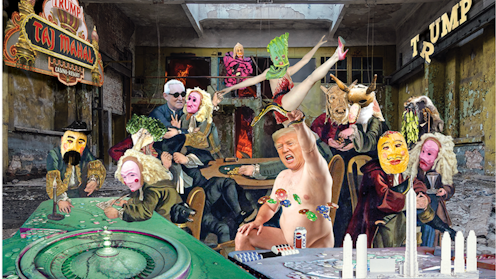Trump takes lead role in Cold War Steve’s reimagining of Hogarth’s 18th-century satire, The Rake’s Progess
A reimagining of the sixth cartoon in William Hogarth’s A Rake’s Progress depicting Trump pleading for divine assistance at a gambling den. Cold War Steve
British satirist Cold War Steve has published a series of images based on the British painter William Hogarth’s The Rake’s Progress (1733-35). Hogarth’s 18th-century original charts the catastrophic decline of an affluent young man, Tom Rakewell. Cold War Steve’s 2025 reimagining substitutes the foolish rake with the US president, Donald Trump.
Hogarth’s eight densely packed images are a forerunner of the modern comic script, a kind of condensed graphic novel. The works swarm with life and hidden meanings for viewers to decode.
Tom starts out in high life, flashing his cash and enjoying himself. But he is rapidly drawn into a vortex of late-night drinking, gambling and prostitution. Desperate to save himself from extreme poverty, he sells himself in marriage to an older woman (no cougar, alas, but a rather decrepit heiress).
Looking for something good? Cut through the noise with a carefully curated selection of the latest releases, live events and exhibitions, straight to your inbox every fortnight, on Fridays. Sign up here.
But he still cannot control his behaviour. Tom is eventually imprisoned for debt, loses his mind – either to syphilis or sorrow – and dies in Bedlam, the notorious 18th-century madhouse.
Hugely popular and culturally influential, A Rake’s Progress is a modern morality tale. It’s a warning against the perils of self-indulgence, and a devastating critique of those too wealthy and foolish to care about the damage they do.
The Gaming House, the sixth engraving in The Rake’s Progress, depicts the protagonist back to his profligate ways after marrying an older wealthy woman.
Wikimedia
Political satire as tragicomedy
Keeping close to the original narrative, Cold War Steve uses the 18th-century paintings as backdrops, while altering the object of the satire by making Trump the main target. Renamed Trump’s Progress, this is a pointed political satire, directed at those in power.
Steve’s is a 21st-century reimagining, not a pious homage. Instead, Trump’s Progress has an irreverent punk aesthetic: a horde of Trump-supporting celebrities (such as Don King, Hulk Hogan and Liberace) are photoshopped into his digital canvases, cavorting crazily alongside Trump as he moves from his immense wealth to political pre-eminence.
Cold War Steve’s reimagining of A Rake’s Progress with Trump as its protagonist.
Cold War Steve
Both funny and dark, this is political satire as tragicomedy. The contemporary satirist takes Hogarth as precedent, suggesting a bad end lies in store for the president.
Just as the 18th-century rake ends up in the madhouse, Cold War Steve ends his sequence with an aged Trump lying in a prison cell. Trump is tended to by Israel’s prime minister, Benjamin Netanyahu, and his daughter Ivanka, while his other erstwhile friends look less than pleased to be incarcerated along with him.
Hogarth was a key figure in 18th-century culture. His images of late-night drunkenness , sleazy politicians, and the cheek-by-jowl of luxury living and extreme poverty encapsulated the irrepressible messiness of modern life.
Hogarth reflected Britain’s aspirations to liberty and progress, but also its ongoing struggles with consumerism, luxury, corruption, and greed. These are issues that dominate our present day too, and give Hogarth’s satires an urgent and unsettling relevance.
This is not the first time Cold War Steve has used historical images from the 18th century to indict the present. In a recent article, I explored how Hogarth became a powerful visual source for the satirist during the COVID-19 crisis.
Hogarth’s Beer Street and Gin Lane.
Wikimedia
In May 2020, Steve published an update of Hogarth’s famous print, Gin Lane. The original shows London as a drunken dystopia, as the poor turned to cheap imported gin to ease their daily grind.
But Cold War Steve’s version dramatically altered the image’s moral message. By populating the city street with members of the Tory party and Britain’s business elite, he accused the government of gross moral negligence in treating the pandemic as an opportunity to make money.
The choice of Hogarth is not accidental. Not merely familiar to students of art history, Hogarth has a cultural legibility that makes his work an influential satirical template for artists who want to comment on the social malaise of their times.
Being in conversation with Hogarth gives contemporary works added gravitas. The veteran cartoonist Steve Bell created numerous parodies of Hogarth throughout his time at the Guardian and other publications.
The penultimate scene in A Rake’s Progress, The Prison Scene, shows the vices of the protagonist having caught up with him.
Wikimedia
In 2016, English artist Thomas Moore created a version in which the 18th-century gin craze has been replaced by the obesity epidemic. Hogarth’s impoverished city street is now full of fast food shops, pubs and pawnbrokers. The manic energy and cultural anxiety of Hogarth’s satires resonates with our own accelerated culture and widespread sense of moral and social decline.
In his study of the cultural afterlives of the 18th century, scholar James Ward has shown that postmodern popular culture often invokes Hogarth to question the assumption that our distance from the past is the same as progress.
By splicing together images of the past with the present, Cold War Steve’s visual satires make the serious political point that society has failed to progress since the enlightenment. In his eyes, the vices that Hogarth showed ravaging his society are still part of a culture of political shamelessness, personified by Trump.
Steve’s energetically subversive reworking of 18th-century material shows how Hogarth’s satires continue to be understood and appreciated by diverse audiences.
Former prime minister Boris Johnson portrayed Hogarth as a patriotic British product. But by successfully translating Hogarth’s satires for a transatlantic audience, Cold War Steve shows that his appeal transcends both national and political divides. Current politics might be almost beyond parody on both sides of the pond, but Steve’s bleak humour shows us that satire is thriving.
Get your news from actual experts, straight to your inbox. Sign up to our daily newsletter to receive all The Conversation UK’s latest coverage of news and research, from politics and business to the arts and sciences.
Rebecca Anne Barr does not work for, consult, own shares in or receive funding from any company or organisation that would benefit from this article, and has disclosed no relevant affiliations beyond their academic appointment.



